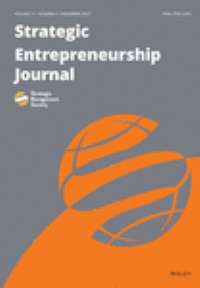Public support and VC financing in academic startups
IF 6.3
2区 管理学
Q1 BUSINESS
引用次数: 0
Abstract
Research SummaryWe investigate public support and venture capital (VC) investment in academic startups. Government support may enable follow‐on investment by providing a quality signal to investors. This signal is especially important for academic startups, which face large funding gaps due to their complexity, cutting‐edge nature, and uncertainty regarding the founders' management capabilities and commitment. Using a panel of startups in Germany, our analyses confirm that academic startups are more likely to obtain follow‐on VC investment after receiving public support than non‐academic startups. Further, this effect is limited in time, lasts longer for academic startups, is concentrated in high‐tech manufacturing firms, and is stronger for investments from business angels. Our findings have implications for policymakers seeking to foster academic entrepreneurship through policy programs and VC investment.Managerial SummaryObtaining seed and growth capital is essential for potentially highly innovative startups. We show that startups that obtain public support are more likely to receive VC funding and that this effect is stronger for startups with academic founders, approximately twice as large. We further show that this benefit is limited in time, concentrated in the high‐tech manufacturing industry, and more salient for business angel financing than for investment by independent VC funds or corporate VCs. For founders of academic startups, our results imply that acquiring public support might enhance the chances of attracting follow‐on financing.学术初创企业的公共支持和风险投资
本文研究了公众对学术创业公司的支持和风险投资。政府的支持可以通过向投资者提供高质量的信号,使后续投资成为可能。这一信号对于学术性初创企业尤其重要,由于其复杂性、尖端性以及创始人管理能力和承诺的不确定性,这些初创企业面临着巨大的资金缺口。通过对德国创业公司的调查,我们的分析证实,在获得公众支持后,学术创业公司比非学术创业公司更有可能获得后续风险投资。此外,这种效应在时间上是有限的,对学术初创企业持续时间更长,集中在高科技制造企业,对商业天使投资的影响更大。我们的研究结果对寻求通过政策项目和风险投资促进学术创业的政策制定者具有启示意义。获得种子和成长资本对于潜在的高度创新的初创公司是必不可少的。我们的研究表明,获得公众支持的初创公司更有可能获得风险投资,而这种效应对拥有学术创始人的初创公司更强,大约是前者的两倍。我们进一步表明,这种好处在时间上是有限的,集中在高科技制造业,并且在商业天使融资中比独立风险投资基金或企业风险投资更突出。对于学术初创企业的创始人来说,我们的研究结果表明,获得公众支持可能会增加吸引后续融资的机会。
本文章由计算机程序翻译,如有差异,请以英文原文为准。
求助全文
约1分钟内获得全文
求助全文
来源期刊

Strategic Entrepreneurship Journal
Multiple-
CiteScore
11.10
自引率
1.60%
发文量
31
期刊介绍:
The Strategic Entrepreneurship Journal is a research journal that publishes original work recommended by a developmental, double-blind review process conducted by peer scholars. Strategic entrepreneurship involves innovation and subsequent changes which add value to society and which change societal life in ways which have significant, sustainable, and durable consequences. The SEJ is international in scope and acknowledges theory- and evidence-based research conducted and/or applied in all regions of the world. It is devoted to content and quality standards based on scientific method, relevant theory, tested or testable propositions, and appropriate data and evidence, all replicable by others, and all representing original contributions. The SEJ values contributions which lead to improved practice of managing organizations as they deal with the entrepreneurial process involving imagination, insight, invention, and innovation and the inevitable changes and transformations that result and benefit society.
 求助内容:
求助内容: 应助结果提醒方式:
应助结果提醒方式:


